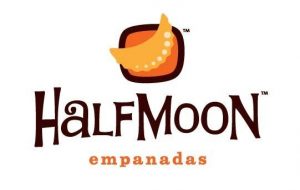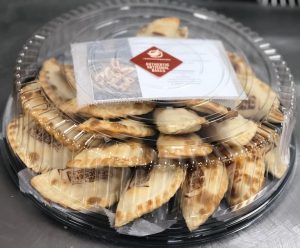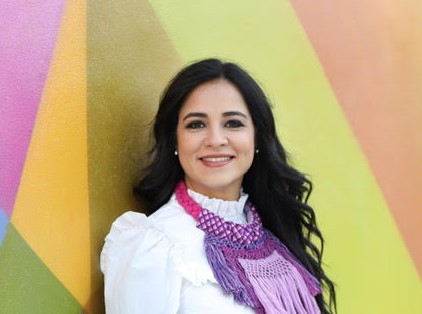Pilar Guzman Zavala was still beaming with energy and excitement having just returned from an airport conference in Denver in early March. Her small business, Half Moon Empanadas, was preparing to expand nationally, and the interest at the large tradeshow was “amazing.”
But what seemed like overnight, she and her co-founder and husband, Juan Zavala, were soon confronting a new reality: COVID-19. It was shocking and heartbreaking to temporarily close all but one of their 13 locations in Miami, which include two Miami International Airport locations, multiple campus locations at University of Miami and Florida International University and five coffee kiosks at Miami Beach Convention Center. They were looking at zero sales for who really knows how many months. Only their walk-up window on NE 79th Street is currently open for takeout and deliveries.
 But over the 12 years since founding Half Moon Empanadas, and growing the food business to about 100 employees, this CEO knows that entrepreneurship can be a difficult and lonely journey. Early on, the business almost went bankrupt because of cash flow issues. Lessons learned then have helped her navigate this current crisis. And just like many other entrepreneurs, Pilar is looking for ways to innovate and create new ways to reach customers. “We are offering discounts, delivery, and smiles to everyone who comes up to our window to take home our delicious empanadas.”
But over the 12 years since founding Half Moon Empanadas, and growing the food business to about 100 employees, this CEO knows that entrepreneurship can be a difficult and lonely journey. Early on, the business almost went bankrupt because of cash flow issues. Lessons learned then have helped her navigate this current crisis. And just like many other entrepreneurs, Pilar is looking for ways to innovate and create new ways to reach customers. “We are offering discounts, delivery, and smiles to everyone who comes up to our window to take home our delicious empanadas.”
Small businesses like Pilar’s are huge players in the Miami-Dade economy. According to the “Small Business. Big Impact” report authored by Florida SBDC at FIU in 2018, 53.3 percent of Miami-Dade’s workforce is employed by 82,293 small businesses. And Half Moon Empanadas is hardly alone in feeling the coronavirus wallop. A national survey out this week of 6,000 small business by Harvard Business School found that 43% of firms are temporarily closed and 40% of the workforce, on average, has been laid off or furloughed in this current crisis. The percentage goes 50% higher for restaurants and café businesses.
I have followed Pilar’s journey since her early days and believe her story can offer inspiration and lessons as small businesses navigate these unprecedented times. It’s a story about stepping up as a leader, learning from the past and executing on a strategy to get through this.
Closing stores and letting go of her hourly employees, mainly her cashiers, was heartbreaking, she said. “It brought back a lot of memories when we almost went bankrupt in the early days. But there is nothing good about those negative emotions. It is a time when leaders need to step up. I know my team is looking up to me. If I am stressed and nervous and don’t know what to do, they are going to feel worse. I have to focus on the positive.”
Pilar knew the first positive step to take would be to look deeply at cash flow and question every expenditure, conserving every dollar possible. And as soon as she started hearing about the state’s bridge loan program for small business, and later government-backed relief loans such as the Paycheck Protection Program (PPP), she began getting her records in order to be ready to apply on day one.
Pilar already has received a Florida Small Business Emergency Bridge Loan from the state. Florida SBDC at FIU, the small business development center within the university’s College of Business, helped her apply for the $100,000 loan.
“I was one of the lucky ones. I knew the funds are limited so I applied right away. The small business development center really helped me,” she said, adding that the money arrived last week. And she was correct about the limitations; the state announced today that all the funds in the $50 million program have been allocated.
The money was a big relief but the no-interest bridge loan is for one year (after a year the rate is 12%) and meant to be a bridge until other funds, such as the SBA’s PPP program, become available. Pilar has also applied for a forgivable PPP loan, a government-backed loan administered through SBA-partnering banks, She applied through her bank, Bank of America, on April 3, the first day of the program. After some initial correspondence that her application was accepted and a request for documents that she immediately submitted, she has heard nothing.
Pilar is a member of EO South Florida (Entrepreneurs Organization), and some members who applied for PPP loans through smaller community banks have already been approved. The 2-year, 1% loans are designed to be forgivable if small business owners keep on their staff or hire staff back as soon as they can. She also applied for the SBA’s low-interest Economic Injury Disaster Loan but has also heard nothing. Those loans, which were supposed to be up to $2 million, have now reportedly been limited to $15,000 because of a lack of funds.
“I took the risk of continuing to pay my 11 salaried managers. I think it is the right thing to do. They have been there for me through all the crazy growth, so now I need to be there for them.”
While Half Moon locations are closed, the Zavalas are using this time to work on their digital presence. That includes putting the finishing touches on a major rebranding effort they plan to launch after they reopen.
“We bought a new kitchen last year in preparation for expanding nationally in airports and doing sales online. This crisis reinforces how important it is as a business to have an online presence, to be able to deliver your product anywhere.”
Here is some more of Pilar’s advice:
- As a small business, you have to be very smart about lowering every expense possible. Defer your loans, negotiate with landlords on rents. They are in the same boat so most of them are going to understand and make a plan with you, she said.
- Be ready and organized to apply as new loans and grant offerings come out. And don’t be hesitant to ask for other help and support. A personal Facebook post among her friends offering large platters for Easter yielded 25 orders for the business.
 This is a moment to be creative. Pilar is hoping to take part in county efforts to provide meals for low-income residents.
This is a moment to be creative. Pilar is hoping to take part in county efforts to provide meals for low-income residents.- Check out Axis South Florida (AxisHelps.org), a new website by Citi and Microsoft that provides many useful resources for both business owners and employees.
- Use this time to think strategically about your business. “After this crisis passes, there will be opportunities because I know my company will be OK, but sadly there will be a lot of businesses that won’t be able to make it. So it’s about how to position yourself to take advantage of opportunities the future will bring.”
- And lastly, she said, stay positive and trust the process. “We are in a great country, that I can tell you. Coming from Mexico and looking at what is happening with businesses over there, we are in a great country and we should appreciate that.”
UPDATE: Pilar applied to U.S. Century Bank for a PPP loan and was approved in one day.
READ MORE ON GROWBIZ
Communicate with your team with frequency, empathy and transparency. Here’s how
How to market during the COVID-19 crisis, and the recession it brings
Advice on navigating a COVID-19 downturn isn’t one-size-fits all, so we offer all sizes
COVID-19: Practical actions small business owners can take now
COVID-19: Resources for small businesses
Please send GrowBiz topic suggestions and feedback to GrowBiz@FIU.EDU.

